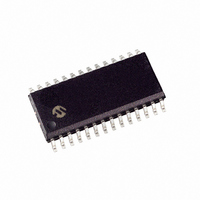PIC16LF767-I/SO Microchip Technology, PIC16LF767-I/SO Datasheet - Page 135

PIC16LF767-I/SO
Manufacturer Part Number
PIC16LF767-I/SO
Description
IC PIC MCU FLASH 8KX14 28SOIC
Manufacturer
Microchip Technology
Series
PIC® 16Fr
Specifications of PIC16LF767-I/SO
Core Size
8-Bit
Program Memory Size
14KB (8K x 14)
Peripherals
Brown-out Detect/Reset, POR, PWM, WDT
Core Processor
PIC
Speed
10MHz
Connectivity
I²C, SPI, UART/USART
Number Of I /o
25
Program Memory Type
FLASH
Ram Size
368 x 8
Voltage - Supply (vcc/vdd)
2 V ~ 5.5 V
Data Converters
A/D 11x10b
Oscillator Type
Internal
Operating Temperature
-40°C ~ 85°C
Package / Case
28-SOIC (7.5mm Width)
Controller Family/series
PIC16LF
No. Of I/o's
25
Ram Memory Size
368Byte
Cpu Speed
20MHz
No. Of Timers
3
Processor Series
PIC16LF
Core
PIC
Data Bus Width
8 bit
Data Ram Size
368 B
Interface Type
AUSART, CCP, I2C, MSSP, SPI
Maximum Clock Frequency
20 MHz
Number Of Programmable I/os
25
Number Of Timers
8
Operating Supply Voltage
2 V to 5.5 V
Maximum Operating Temperature
+ 85 C
Mounting Style
SMD/SMT
3rd Party Development Tools
52715-96, 52716-328, 52717-734
Development Tools By Supplier
PG164130, DV164035, DV244005, DV164005, PG164120, ICE2000
Minimum Operating Temperature
- 40 C
On-chip Adc
10 bit
Data Rom Size
368 B
Height
2.31 mm
Length
17.87 mm
Supply Voltage (max)
5.5 V
Supply Voltage (min)
2 V
Width
7.49 mm
Lead Free Status / RoHS Status
Lead free / RoHS Compliant
Eeprom Size
-
Lead Free Status / Rohs Status
Details
- Current page: 135 of 276
- Download datasheet (6Mb)
11.0
The Addressable Universal Synchronous Asynchronous
Receiver Transmitter (AUSART) module is one of the
two serial I/O modules. (AUSART is also known as a
Serial Communications Interface or SCI.) The AUSART
can be configured as a full-duplex asynchronous system
that can communicate with peripheral devices, such as
CRT terminals and personal computers, or it can be
configured as a half-duplex synchronous system that
can communicate with peripheral devices, such as A/D
or D/A integrated circuits, serial EEPROMs, etc.
REGISTER 11-1:
2004 Microchip Technology Inc.
ADDRESSABLE UNIVERSAL
SYNCHRONOUS
ASYNCHRONOUS RECEIVER
TRANSMITTER (AUSART)
bit 7
bit 6
bit 5
bit 4
bit 3
bit 2
bit 1
bit 0
TXSTA: TRANSMIT STATUS AND CONTROL REGISTER (ADDRESS 98h)
bit 7
CSRC: Clock Source Select bit
Asynchronous mode:
Don’t care.
Synchronous mode:
1 = Master mode (clock generated internally from BRG)
0 = Slave mode (clock from external source)
TX9: 9-bit Transmit Enable bit
1 = Selects 9-bit transmission
0 = Selects 8-bit transmission
TXEN: Transmit Enable bit
1 = Transmit enabled
0 = Transmit disabled
SYNC: AUSART Mode Select bit
1 = Synchronous mode
0 = Asynchronous mode
Unimplemented: Read as ‘0’
BRGH: High Baud Rate Select bit
Asynchronous mode:
1 = High speed
0 = Low speed
Synchronous mode:
Unused in this mode.
TRMT: Transmit Shift Register Status bit
1 = TSR empty
0 = TSR full
TX9D: 9th bit of Transmit Data, can be Parity bit
Legend:
R = Readable bit
-n = Value at POR
Note:
R/W-0
CSRC
SREN/CREN overrides TXEN in Sync mode.
R/W-0
TX9
R/W-0
TXEN
W = Writable bit
‘1’ = Bit is set
R/W-0
SYNC
The AUSART can be configured in the following
modes:
• Asynchronous (full-duplex)
• Synchronous – Master (half-duplex)
• Synchronous – Slave (half-duplex)
Bit SPEN (RCSTA<7>) and bits TRISC<7:6> have
to be set in order to configure pins RC6/TX/CK and
RC7/RX/DT
Asynchronous Receiver Transmitter.
The AUSART module also has a multi-processor
communication capability using 9-bit address detection.
U = Unimplemented bit, read as ‘0’
‘0’ = Bit is cleared
U-0
—
as
the
R/W-0
BRGH
PIC16F7X7
Universal
x = Bit is unknown
TRMT
DS30498C-page 133
R-1
Synchronous
R/W-0
TX9D
bit 0
Related parts for PIC16LF767-I/SO
Image
Part Number
Description
Manufacturer
Datasheet
Request
R

Part Number:
Description:
IC PIC MCU FLASH 8KX14 28SOIC
Manufacturer:
Microchip Technology
Datasheet:

Part Number:
Description:
IC PIC MCU FLASH 8KX14 28QFN
Manufacturer:
Microchip Technology
Datasheet:

Part Number:
Description:
IC MCU FLASH 8KX14 28SOIC
Manufacturer:
Microchip Technology

Part Number:
Description:
IC PIC MCU FLASH 8KX14 28DIP
Manufacturer:
Microchip Technology
Datasheet:

Part Number:
Description:
IC,MICROCONTROLLER,8-BIT,PIC CPU,CMOS,SSOP,28PIN,PLASTIC
Manufacturer:
Microchip Technology
Datasheet:

Part Number:
Description:
Manufacturer:
Microchip Technology Inc.
Datasheet:

Part Number:
Description:
Manufacturer:
Microchip Technology Inc.
Datasheet:

Part Number:
Description:
Manufacturer:
Microchip Technology Inc.
Datasheet:

Part Number:
Description:
Manufacturer:
Microchip Technology Inc.
Datasheet:

Part Number:
Description:
Manufacturer:
Microchip Technology Inc.
Datasheet:

Part Number:
Description:
Manufacturer:
Microchip Technology Inc.
Datasheet:










